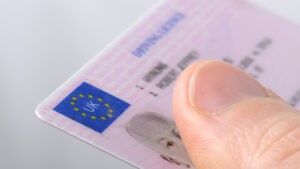
CREDIT: Fresh Start Images/ Alamy Stock Photo
In his forth regular monthly column for SHP, Simon Turner talks about the legal obligations of checking your drivers are qualified to operate the vehicles.
If anyone is driving for work, their employer has a legal obligation to ensure that they are qualified for the vehicle they are driving, and that they remain qualified.
Therefore a standard part of any recruitment procedure should be to check the employee’s driving licence qualification prior to giving them a vehicle, or allowing them to drive for work in their own vehicle.
It is often easiest for companies to employ a third-party organisation to carry out such checks, although it is possible to check DVLA records directly with the driver’s consent. However, this can be administratively burdensome, so specialist firms are sometimes preferred.
Future checks should be carried out at least every twelve months, although industry good practice is at least every six months, to ensure that no penalty points or endorsements have disqualified the driver in the interim.
Driver policies should clearly state that drivers are obliged to tell their employer if they receive licence endorsements or have lost their licence. Best practice would also be to monitor licence points accrual, as this can be an indicator that the driver requires remedial training to avoid breaching road traffic laws.
Associated checks
Whether the checks are carried out in-house or by a third party, there should be a clear system for showing which licences, training, or accreditations are due to be checked or renewed. This includes those working with manual handling or specialist equipment, such as vehicle-mounted lifting equipment.
HGV or PSV drivers will also need to have their Driver Qualification Card (DQC) up to date, reflecting the five days of continuous professional development they require for each five- year period.
It can be useful to combine these licence checks with other associated tests, such as eyesight or medical fitness exams.
Grey fleet
There are thought to be some 14m grey fleet vehicles on UK roads according to BVRLA’s estimate. This is circa one third of the vehicles in the UK, with another 6 million being fleet assets.
While it may feel more intrusive to check an employee’s licence, the MOT certificate, vehicle tax and the insurance for their own car, it is absolutely essential that these checks are done if the vehicle is being used for work beyond commuting. It is your legal responsibility to ensure both the driver and vehicle are safe and eligible to be on the roads for work purposes.
Moreover – that would mean one-third of the vehicles in the UK were being checked for driver qualification, tax, insurance and basic roadworthiness. That would be a significant contribution to road safety in itself.
Organisations can go further, of course, and educate grey fleet drivers’ about pre-use checks, and regular servicing. Employers have a duty of care to ensure that any work undertaken on their behalf is carried out safely, and that includes the employee’s driving proficiency and the safety of the vehicle they are in. Industry good practice is to treat your grey fleet drivers in exactly the same way as you treat drivers of company vehicles. Some of the most progressive organisations extend the driver training and e-learning which is available to their fleet drivers to all their employees.
Peter Golding, MD at FleetCheck, said: “Checking driving licences, and ensuring they are rechecked regularly, is a key part of your responsibilities as an employer whose staff use vehicles, whether company or employee-owned. You need to adopt a risk profile approach – the more points on a licence, the higher the risk and the more often they need to be rechecked.
“This is a definite legal responsibility under the Road Traffic Act while drivers without a legal licence are also uninsured. However, it is also, ultimately, an ethical one. Identifying any issues with an employee’s driving licence is central to keeping that employee and other road users safe.”
The Safety Conversation Podcast: Listen now!
The Safety Conversation with SHP (previously the Safety and Health Podcast) aims to bring you the latest news, insights and legislation updates in the form of interviews, discussions and panel debates from leading figures within the profession.
Find us on Apple Podcasts, Spotify and Google Podcasts, subscribe and join the conversation today!


